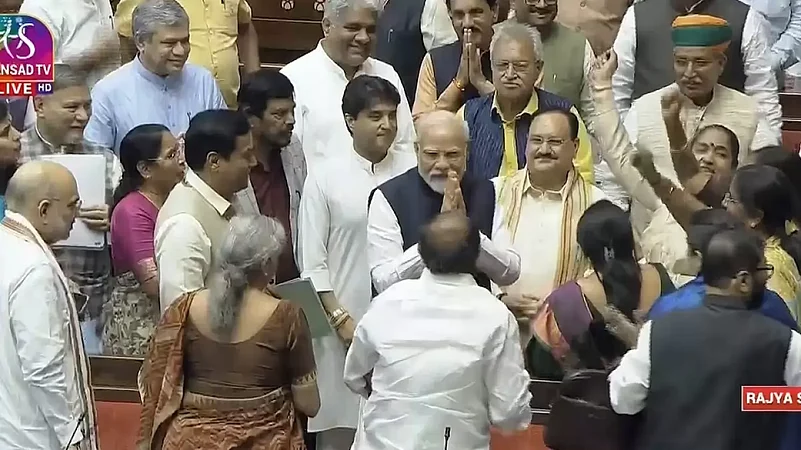In a historic development, Rajya Sabha cleared the women’s reservation bill in a rare sight of unanimous support with 171 votes in favour and none against it. Tabled by Law Minister Arjun Ram Meghwal, the Bill was passed in the Lok Sabha with bipartisan support as well, with 454 members voting in its favour and only two against it. The bill seeks to reserve one-third of the seats in the Lok Sabha, the state legislative assemblies and the legislative assembly of Delhi. It will now be sent to President Droupadi Murmu for assent.
Thanking the MPs for supporting the legislation and congratulating the country for its long-standing passage, Prime Minister Narendra Modi termed it "A defining moment in our nation's democratic journey.”
“Congratulations to 140 crore Indians. I thank all the Rajya Sabha MPs who voted for the Nari Shakti Vandan Adhiniyam. Such unanimous support is indeed gladdening. With the passage of the Nari Shakti Vandan Adhiniyam in Parliament, we usher in an era of stronger representation and empowerment for the women of India. This is not merely a legislation; it is a tribute to the countless women who have made our nation. India has been enriched by their resilience and contributions. As we celebrate today, we are reminded of the strength, courage, and indomitable spirit of all the women of our nation. This historic step is a commitment to ensuring their voices are heard even more effectively," he wrote in a post on ‘X’ (formerly Twitter).
Formally known as the Constitution (128th Amendment) Bill, also the ‘Nari Shakti Vandan Adhiniyam, 2023’, it has been in the works for the last 27 years. It was the first bill to be tabled and passed in the new parliament building. However, the bill requires a delimitation exercise to be undertaken based on census data to come into effect.
The debate in Rajya Sabha went on for 11 hours with several Opposition members reiterating the need to accelerate the process of implementation instead of waiting for a fresh census and delimitation exercise. They also demanded the inclusion of OBC and minority quota within the women’s reservation.
Taking part in the discussion, Elamaram Kareem of CPI(M), while supporting the bill, said the BJP had promised to bring the women's reservation bill in 2014 and in 2019 as well but did not take any action. He called it an election gimmick by the BJP after losing elections in Karnataka and Himachal Pradesh, besides facing defeat in the civic polls in Delhi polls.
Trinamool Congress Derek O'Brien, while also supporting the bill, criticised the government for its "commando-style operation" with "secrecy, surprise and stealth".
Nirmala Sitharaman, on the other hand, asserted that the BJP does not play politics in matters related to women. Praising its introduction in the Parliament, she said the government convened the special session to give a “good start” to the new building of Parliament. "We have come into a new complex, new building for Parliament, new India. We would like this Parliament to deal with one of the best bills that it can deal with."
Earlier today, Rajya Sabha Chairman Jagdeep Dhankhar also reconstituted the panel of Vice-Chairpersons comprising 13 women Rajya Sabha Members for the day.
Rajya Sabha was adjourned sine die after the passage of the bill.
A similar women’s reservation bill was passed in Rajya Sabha 13 years ago in 2010. However, the legislation had then stalled in Lok Sabha due to strong opposition from SP and RJD over the lack of a sub-quota for OBC women. The Rajya Sabha had witnessed chaotic scenes with SP MPs Nandkishore Yadav and Kamal Akhtar climbing atop the table of Chairman Hamid Ansari, and Yadav uprooting a microphone.
This was the first time that the women's quota bill had been put to vote in Lok Sabha and it cleared past the required two-thirds majority, with only two leaders of the AIMIM including Asaduddin Owaisi opposing it. They contended that the proposed law would provide reservation only to "savarna women" and exclude OBC and Muslim women who have little representation in Parliament.
At present, women make up for nearly half of India's 95 crore registered voters but account for only 15 per cent of lawmakers in Parliament and 10 per cent in the state assemblies.


























